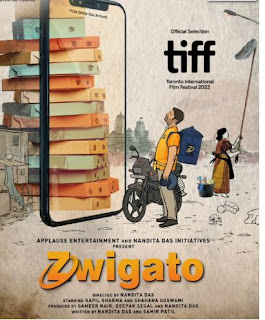Zwigato follows an individual who lost his job and works as a food delivery agent post-pandemic. While the lockdown has brought new rules like working from home and online classes, they are not the solution for all. The manager of a manufacturing company, quality inspector, a site engineer has nothing to do from home. Manas is one of them.
 |
| https://www.imdb.com/title/tt21998526/ |
Manas - Pratima couple runs a middle-class family with his mother and two children. Manas represents millions of delivery partners working with Zwigato. Just as school children polish their shoes, Manas has a statement to start his day: Today I will make ten deliveries. Anyone with a goal of ten deliveries has no rules of the road, no fear of death, and no time to stop, eat, or even drink water.
Pratima makes the home and when Manas's income is not enough she runs to do massage as a home service. Later she realizes that, it is not easy to enter apartments where there are separate lifts for residents and employees. Then she opts for sanitation work in a shopping mall at night. Despite the attractive uniform and higher salary than her husband, sick mother and Manas makes her to stay home.
In the chain of Corporate-Worker-Consumer, it is not just individuals who meet at the inevitable point of their necessity: When people meet, their castes meets, religions meets, different classes meets, various thoughts meet, and different body odours meet. Such intersections have many stories to tell. It is not just a story of the middle class, but a story of classes. Sanitation workers, Garbage collectors, Construction workers, Apartment youths, School Principal, and other economic elites are naturally brought into the play and taken through the equally spread inequality and distress.
The film has succeeded in carving out the hierarchies of society by allowing the characters to evolve naturally and by setting the screenplay in such a way that there is no sound of campaign or pity. The job engulfs the entire family where the head doing late-night calculations of the day, a wife who lost her time with her husband, a daughter who is the best student in her class but gets mocked for the work her father doing, and a son who sits behind and carries his father's burden on his shoulders.
In a country where everything is allowed, it is easy for the employer to say 'get out' at any time but for an employee, it is not easy to throw the uniform. Both for the same reason - there are many queuing up in office to take that job. When unemployment stands as a major problem, the film questions whether the food delivery corporate's claims of employing millions are behaving humanely. Corporate psychological violence is well depicted through AI voice that kindly speaks inhumanly by constantly monitoring employees through mobile application and giving instant punishments and fines as remedies.
The film is not expecting a revolution by pointing out the darker sides of the corporate-labor-consumer relationship. Rather, in this paradoxical system does not change easily, it teaches us to have some compassion, kindness, sense of dignity towards our fellow humans who serve us, who knock the door to meet our needs.
Set is in Bhubaneswar, Kapil Sharma (Manas) - Sahana Goswami (Prathima), Children and Older woman fit a family well. Though most of them are theatre artists and newcomers yet nowhere it’s found odd. No dialogue or pain seems to be forced. The sporadic one-liners evoke a burst of laughter in many places. Background score by Sagar Desai is so integrated with the film that one didn't even notice its presence. The animation and the music for titles, especially at the end uplifts what the film wants to convey. But it missed the problems faced by women delivery partners, which are broader and different.
Is there any glimmer of hope apart from the climax in a film that criticizes class and corporate antagonism? It seems. In one of the earlier scenes, a boy visits for collecting garbage and asks Pratima for water. Having seen Pratima for some time, I believe what she shares is a portion of the water she drinks and she gives it the same cup which she uses to drink. I am not sure, but I hope so.
(Seen Indian Premiere at 27th IFFK, Kerala)
No comments:
Post a Comment